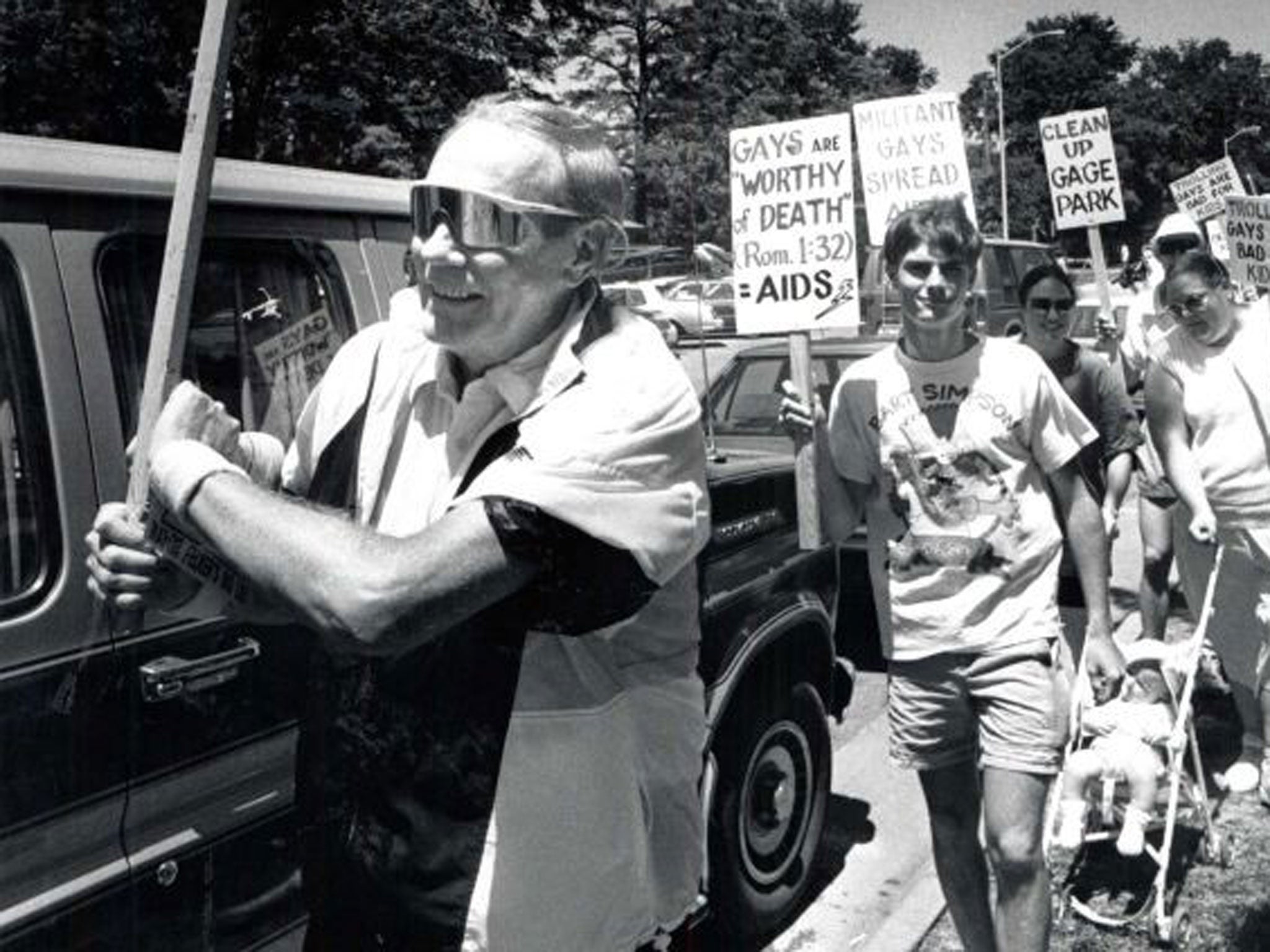Reverend Fred Phelps: Baptist preacher who attracted widespread condemnation for his rabid homophobic protests at US military funerals
Placards carried messages like ‘Thank God For Dead Soldiers’

Fred Phelps was a preacher whose anti-gay picketing at military funerals inflamed the US and drew international scorn but was protected by the US Supreme Court as an exercise in free speech. “Hate,” his bumper stickers proclaimed, “Is a Bible Value.” He was an ordained Baptist minister, a disbarred Kansas lawyer and, according to a BBC documentary, the patriarch of the “most hated family in America.”
The Southern Poverty Law Center, a civil rights group, described his Westboro congregation as “arguably the most obnoxious and rabid hate group in America.” His bigotry even offended the Ku Klux Klan, which staged protests to counter Westboro’s demonstrations at military funerals.
The church’s following consisted mainly of the extended Phelps family and assorted outsiders who shared the founder’s view of an unforgiving, vengeful God. Phelps dispatched followers to parks and street corners with homophobic and antisemitic placards, some wielded by his grandchildren as young as seven. He attacked gays, Jews, immigrants, politicians, celebrities and church leaders whose more tolerant theology he considered an abomination. “You’re not going to get nowhere with that slop that ‘God loves you’,” he said. “That’s a diabolical lie from hell without biblical warrant.”
The group began drawing attention in the 1990s for its vitriolic campaign against homosexuality. Phelps chose funerals – and military funerals in particular – as his chief forum. His slogan “God Hates Faggots” was widely repeated at public appearances and in promotional material. Phelps and his followers protested at hundreds, perhaps thousands, of funerals, including those of Frank Sinatra, Barry Goldwater, the civil rights activist Coretta Scott King and the miners who died in the 2006 Sago Mine disaster in West Virginia.
He also picketed the funeral of the children’s television presenter Fred Rogers, who had neglected, he said, to warn young viewers that sodomy is a sin. The public outcry was particularly strong when Westboro followers picketed the 1998 funeral of Matthew Shepard, the college student who was tortured, tied to a fence and left to die near Laramie, Wyoming, apparently because he was gay.
In the 2000s the Westboro group began picketing funerals for soldiers who had died in Iraq and Afghanistan. Phelps argued that God killed US soldiers to punish the country for its tolerance of gays. At memorial services, Phelps and his supporters displayed placards with messages such as “Thank God for Dead Soldiers.” One of the protests, at the 2006 funeral of Marine Lance Corporal Matthew Snyder, who died in Iraq, led Snyder’s family to sue Westboro for invasion of privacy and intentional infliction of emotional distress. A jury awarded the family nearly $11m in damages, an amount later reduced by the judge. An appellate court, citing protected speech, ruled for the church. In 2011, the Supreme Court upheld the appellate court’s decision. “Such speech cannot be restricted simply because it is upsetting or arouses contempt,” Chief Justice John Roberts wrote for the majority.
In reaction, dozens of states and the federal government passed laws to create buffer areas near the sites of funerals. Phelps and his daughter, Shirley Phelps-Roper, were placed on a list of extremists banned from entry into the UK for “fostering hatred which might lead to inter-community violence.”
He was born in Meridian, Mississippi, in 1929. After his mother died of cancer he was mostly raised by an aunt. His father, a railway detective, was often away on business. Fred was ordained as a Baptist minister at 17 and became a street-corner preacher while taking classes at college. His denunciations of rampant “petting” by students at John Muir College in Pasadena were covered by Time magazine.
While preaching at a church, he met Margie Simms; they married and settled in Topeka, where Phelps started the Westboro church. He sold vacuum cleaners and pushchairs then graduated from Washburn University in Topeka and its law school. Incongruously, he took on many civil rights cases. But his income until the mid-1970s came largely from door-to-door sales of sweets by his 13 children. After complaints from his legal clients, the Kansas Supreme Court disbarred him in 1979, citing his “little regard for the ethics of his profession.”
In 1989, after prolonged legal woes, he surrendered his licence to practice law in federal courts. He made a foray into politics, running high-venom but unsuccessful campaigns as a Democratic candidate for Kansas governor and US senator. He first began anti-gay demonstrations in 1991 after one of his grandsons was propositioned at Topeka’s Gage Park. He called for a “decency drive” and sent such a barrage of faxes to city officials that the state moved to prohibit harassment by fax.
Phelps was estranged from at least four of his children, including two sons who alleged years of physical abuse by their father and who left his church years ago. Two of Phelps’ granddaughters who participated in protests left the church last year and apologised for the public pain they had caused.
Fred Waldron Phelps, lawyer and preacher: born Meridian, Missisippi 13 November 1929; married 1952 Margie Simms (13 children); died Topeka, Kansas 19 March 2014.
© The Washington Post
Subscribe to Independent Premium to bookmark this article
Want to bookmark your favourite articles and stories to read or reference later? Start your Independent Premium subscription today.

Join our commenting forum
Join thought-provoking conversations, follow other Independent readers and see their replies